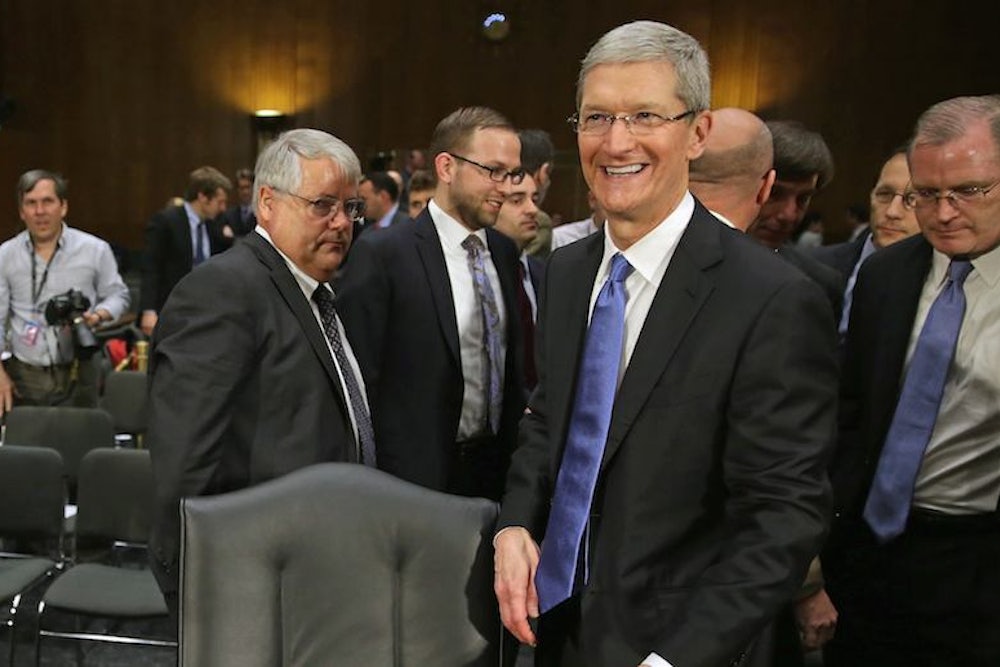It's possible that no chief executive going before the Senate’s Permanent Subcommittee on Investigations has had a more friendly hearing room than Apple CEO Tim Cook.
An Apple logo stared at him comfortingly from the official notetaker's desk. About half of the reporters at the tables behind him were tapping furiously away on MacBooks. The gaggle of photographers, once they shot Cook and his entourage in a flurry of shutter clicks, brought out their iPhones to take personal snapshots; during a break, Cook flashed thumbs ups to other iPhone paparazzi in the room, and told one of the few PC users that she should switch to a Mac. His interrogators seemed eager to prove how much they use Apple products.
"I love Apple. I love Apple," said Senator Claire McCaskill, upon arriving in the chamber. "I'm Apple, I harassed my husband until he converted to a MacBook."
Senator John McCain prefaced his remarks by saying, "I think it's important for all of us to make very clear the admiration we have for Apple."
"We love the iPhone and the iPad. People in Mexico and Canada love the iPhone and the iPad. I've got one right here!" agreed Michigan Democrat Carl Levin, holding up an iPhone in a yellow case. "My granddaughter even knows how to use it! It's a terrific instrument."
It was an odd theme for a committee hearing that was also trying to nail Apple to the wall: Levin had just issued a 40-page report on how the company shifts money around the world in order to avoid paying American corporate tax rates. It largely backed up the New York Times' blockbuster reporting last year, which described the elaborate schemes Apple uses to preserve its $145 billion pile of cash. And the bespectacled senator used high dudgeon to dramatize just how irresponsible the company had been in finding ways not to hand over a third of its worldwide profits to Uncle Sam.
"Children across the country won't get education from Head Start," Levin said, of budget cuts fed by tax avoidance. "Needy seniors will go without meals. Fighter jets sit idle on tarmacs because our military lacks the funding to keep pilots trained."
The problem, for Levin, was that he made no determination that the company did anything illegal. He berated Cook for doing exactly what Congress has allowed it to do, by failing to update its tax code for a world where capital is mobile and intellectual property is more valuable than physical property. Apple has merely exploited tax loopholes to keep money in the places it's taxed the least, which also happen to be places where he's selling lots of gadgets—two-thirds of its cash on hand is in overseas bank accounts, and two-thirds of its revenue last quarter came from outside the U.S. The experts Levin brought up to testify repeated, again and again, that the current tax system makes no sense. "It's just open season for taxpayers to go do what they want," said Villanova University Law School professor J. Richard Harvey.
Under those conditions, the moral turpitude of "profit shifting" becomes a matter of perspective. Should a company be taxed in the jurisdiction where it invents its products? Or in the jurisdiction where those products are eventually sold? Levin thinks the U.S. tax code should enforce the former, but right now it's not doing a good job. The tall, chiseled Cook, backed by an entourage and well-coached by crisis management consultants, denied any wrongdoing—and brilliantly turned the hearing from a public flogging into a stage for his own tax-reform proposals.
"The way that I look at this is there's no shifting going on that I see at all," Cook told McCain, as if the senator would understand if he just squinted his eyes and tilted his head. "Sir, I have tremendous respect for you. I see this differently than you do, I believe. Honestly speaking, I don't see it as being unfair." Cook thinks there should be a “reasonable tax” on foreign earnings, which would allow more capital to flow back into the States.
Rand Paul, who's reportedly headed to Silicon Valley soon to raise money, rose in full throated defense of the Cupertino delegation.
"We haul before this committee one of America's greatest success stories, and you want applause?" Paul said, like a teenager mocking his old Pop (the hearing was also a proxy war between Paul and McCain, who walked out of the room during the freshman senator's tirades). "I say instead of Apple executives, we should have brought in here a giant mirror, okay? So we could look at the reflection of Congress, because this problem has been created by this awful tax code."
In that way, despite Levin's misdirected rage, the hearing served its purpose: Demonstrating that the tax system needs to change—into something, hopefully, that doesn't depend merely on the goodwill of corporate America.
